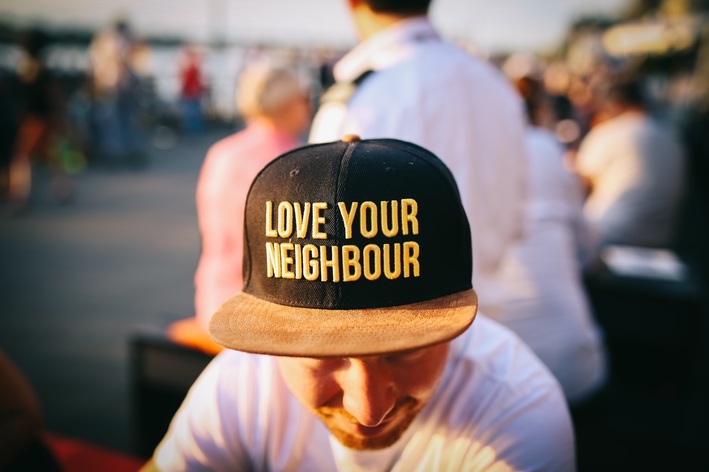|
I’m no Doctor, but I just wanted to publicly share a few of the things that helped and have guided me through my darkest hours during depression. Hopefully a few of these things may help you. Please feel free to share, or to add to the discussion at hand if you’d like.
Some random thoughts, in no particular order: 1. You are not your thoughts. This may sound obvious, but maybe not to someone who’s thoughts are their own worst enemies. Take a moment to let that sink in and realize that the mind that’s constantly narrating life around you, casting judgments, and creating it’s own ruminating reality, is not you. The person who sees those thoughts bouncing around is the real you. Smile at those thoughts, and let those them float freely by, observing them as an outsider as you do. Thoughts come, and thoughts go… Learn how to meditate, if you don’t already. 2. Depression just doesn’t “go away”. And that’s ok. It will lift, and you will feel better, but it never really goes. Once I learned that, I was cool living with that knowledge. Most days are great, some days aren’t. Just like we all fight with a loved one sometimes, so it goes with depression. I have to be careful to avoid triggering moments that might put me in a bad place, but I still extend myself out of my comfort zone when I can. 3. You are not your mistakes or failures. Again, separate entities and events than who you really are. When you make a sandwich, are you a sandwich? A circus is an event, so is filling the car with gas, and so is making a mistake. The same reasoning applies to yourself. When you fail, you are not a failure. If you make a mistake, you are not one yourself. Take that burden off of yourself by again greeting any mistake with a smile and a realization that any opportunity to learn is an opportunity to grow. The tough lesson in this one? Failure and mistakes are good form us. Make mistakes, it's ok. Just stop ruminating on them. 4. Tell society to take a hike. The competitive nature of society is sickening. All the ridiculous ways we’re supposed to un-naturally present ourselves. All the crap our egos are being beaten down with, like how we’re supposed to act, dress, and look. What we need to drive, or the house we need to live in. Society embraces a competitive nature, and although healthy competition is very good for us, unhealthy, is, well, unhealthy. Stop believing the crap you’re being fed there. Stop beating yourself up. Be yourself. 5. Stop living in regret. This is one of those easier said than done situations, but it’s the truth. No matter what happened in the past, let it go. It’s gone. Learn the lesson you need to learn, and be done with it. The day needs to be lived in the now, as in RIGHT now. It’s the only moment you can experience. Living in the past is just a recollection of thoughts (remember those? See #1 above). Recollecting thoughts isn’t living them, it’s just uselessly ruminating on them. 6. Do the work. This is an important one. It’s also one of the most difficult to do when you’re depressed. Do it anyways. Talk to who you need to talk to. Read the books you need to read on attitude, on loving, on giving, and on the scientific causes of your disease. Take the walk when you need to walk. Listen to the YouTube videos on learning how to overcome what you need to overcome. Suck it up and do the work, do the work, do the work. 7. Help others. We should all be doing this anyways, but for someone feeling blue, this can be a genuine life changer (or saver). Give yourself a sense of purpose by making the life of someone else easier. Even little acts of kindness will take your mind off of yourself, and boost your outlook. 8. Seek help if you need it. Enough said. If it’s professional help you need, seek it. If it’s a friend you need to speak to, find one. Bear in mind, not everyone will be overly receptive here, or will understand what you’re going through, but be patient, and spread the wealth. Putting all of your burden onto one person isn’t realistic for either of you. 9. Set some achievable goals. For me it was mountain hiking. It was a quick, achievable goal with a distinct beginning and end point, it was also needed exercise. For you, it may be something else. Even if it’s learning to juggle or paint, pick something. 10. Eat well and exercise. Feeling good mentally has more than you think it does physically. Stay away from the processed foods, sugar, and alcohol. Take a walk, and get some fresh air and natural sunlight on your face. 11. Eliminate the negative. Stay away from folks, TV shows, internet sites or situations that can trigger you. Not everyone or everything is good for us to digest. "Triggers" are small events that hook us into feeling blue or sorry for ourselves. Noticing these triggers can help us steer away earlier from a mental spiral. 12. Take a media fast. Stay off your computer, phone, TV, and social media for an extended break. You'll live, and feel better for it, trust me. Sometimes you're better off not knowing what everyone is up to or what their opinions are. 13. The mind can play tricks on you to make you believe you're much less than you really are. If you were talking to an innocent 6 year old child, would you tell them how unbelievably stupid, ugly, useless they were? Why do you talk to yourself the same way? Take a deep breath, focus, and remind yourself that you're ok. Give yourself permission to like yourself. 14. Stop complaining and be grateful. This is a hard one, for anyone, but especially much harder for someone who is blue. Be careful what you say, and careful what you think. It's perfectly ok to get some junk off of your chest, it's actually quite healthy. Being in a constant state of "never good enough" or picking every little thing apart isn't. You have a lot to be grateful for (and here's a hint, breathing is one of them - they all don't need to be six pack abs and a yacht in the Mediterranean...) **For those of you dealing with a depressed love one, just a few words of note**: Depressed folks aren’t looking for attention (most of the time, anyways), what we’re looking for is acknowledgement and recognition. We just need to know we matter or that you know we simply exist. We will drive you crazy sometimes. We will haunt you and cling to you. My neediness sometimes made me sick, but that’s part of the deal. Be patient. The offer that you’ll “be there if you ever need me” is a heartfelt offer, but bear in mind, to us it’s like having to beg for help by calling someone. Reach out if you know someone is in a bad place. Nobody should have to crawl for help. I will add, that having depression was indeed the best thing that ever happened to me, hands down. I learned more about myself and others in that period than I ever had in my life, and I still am. Be safe and be well!
0 Comments
 When you think of the word compassion, what images do you conjure up? Selfless folks taking a few hours to feed the poor at a soup kitchen during Thanksgiving, or sending flowers and stopping by with a casserole to a sick friend or relative? Those are very accurate descriptions of some wonderful acts of good. I believe a lot of us have a notion that compassion would be some act of kindness that we can carve a little time out for now and again to make the world a better place. Again, you would be correct in thinking those things, and should continue to think and do so. Have you ever stepped back to wonder what genuine compassion is though? What it means to be “all in” compassionate? With a world in such angered turmoil right now, maybe it isn’t a bad idea to think over. The definition of compassion, according to the Merriam-Webster dictionary is: “sympathetic consciousness of others' distress together with a desire to alleviate it.” Sympathetic consciousness of others' distress… Let’s look at that for a moment. There’s a Buddhist parable the Dalai Lama has used to convey this thought of pure compassion on the part of the outsider, or the one who offers compassion, if you will. It’s a simple but powerful sentence and concept. He suggested that if you see a man beating a dog without mercy, you should feel compassion for the man. For most, that image makes the hair on the back of ours neck stand up, and fists clench, but before we get too riled up, let’s examine it for what it is. How many times have you beaten a defenseless being yourself, even if it was just verbally? Have you ever totally lost your cool with your young children? Elderly parents? The woman at the coffee shop making your latte in the morning before you’ve fully woken up? A customer service representative on the phone? A reply or heated argument related to a Facebook post? A spouse? Have you ever abused someone verbally or physically, because of your mood or because you were going through a rough patch in life? Maybe just having a bad day when nothing went right? Have you discovered your abusive behavior is a reaction to something else going on in your life that you’re having a very hard time handling or adjusting too? I’ve known kind people who have acted anything but kind when they simply get hungry (I think the official term for being angry when you’re hungry is “hangry”). Abuse of any kind is, well, unkind. It should not be tolerated, but how many times have we looked deeper into the heart of the suffering (the abuser) to see what the real issue is? A bad childhood? Poverty? Abandonment? Jealousy? None of these are excuses, and can all be worked on to rectify, but I still argue they are reasons for why people act unkindly sometimes. And then there’s the “…with a desire to alleviate it” part, referring to the distress one may suffer. Remember the man beating the dog? How willing are you to not only understand what he may be going through, but having the conviction and wisdom to want to help him? And not for yourself, or the dog’s sake, but help the man for his own sake? That’s tough. Real tough. There’s a lot of people who suffer. People who are scared, feel inferior, unloved, lonely, and forgotten. They all suffer. Their manifestation of that suffering may come out in the forms of anger, sadness, isolating behavior, or mean-spiritedness. They would probably be the first to tell you they don’t think they deserve, or have earned your kindness. That’s the issue with so many who start drawing that line as to when they will stop offering compassion. We’re under the impression that people need to earn it. We look at the homeless or hungry and deem them worthy, but we let the others slip through the cracks, because mean people don’t deserve it. This compassion thing can be tough business sometimes. Offering understanding and kindness to those who we think don’t deserve it is not easy. Make no mistake about that. Thinking and acting with compassion on a constant basis, without judging, mind you, is a challenging full-time job. The act of this sometimes difficult compassion is not for the weak. Don’t ever let someone tell you that compassionate, I mean really compassionate people are sissies. The truly compassionate are strong, and tough individuals. There’s a reason Martin Luther King, Mother Theresa, and Gandhi are all etched permanently in the history books, and are looked upon with such admiration and reverence. It wasn’t just their kindness that left an indelible impression upon us, it was their ability to see the good in every situation and empathize with all, seeing things from everyone’s perspective. How compassionate are you? In seeing the fear in people’s hearts through their actions or behaviors? People are suffering, and they need your help. Have you just been looking for it in the wrong places? |
Matt LandryLet me be your tour guide to life. I'm the author of "Learning to be Human Again", and just like you, I'm still happily trying to figure this wonderful life out. Archives
September 2017
Categories |



 RSS Feed
RSS Feed
